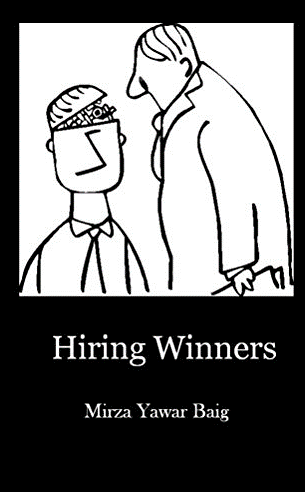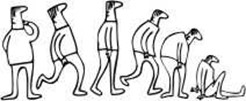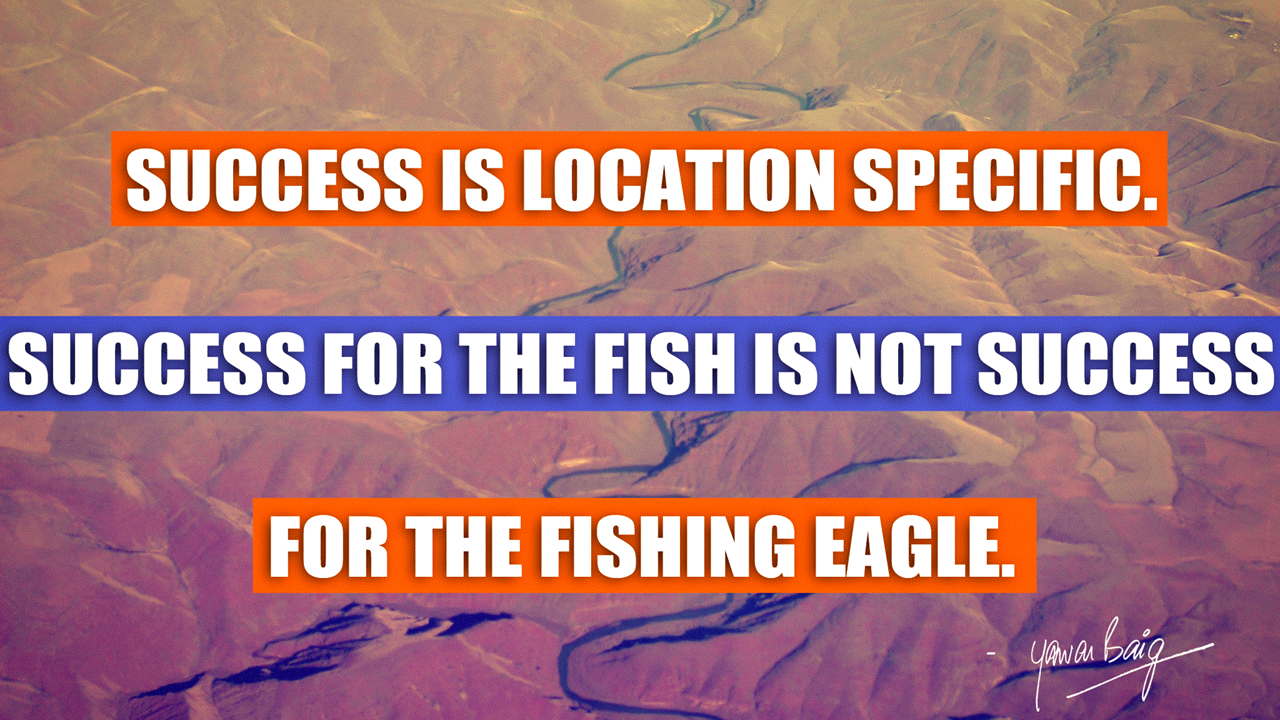
In my practice of helping business leaders develop a winning culture, the thing that I have been most keenly aware of, is the need to hire winners. It is true that good training can achieve much. But it is equally true that no matter how good the training course or the trainer there are some things which can’t be ‘trained in’. Losers will never become winners because of training. As they say, ‘If you want someone to climb trees, hire a monkey.’ Hiring a rabbit and training him will get you nowhere because there are certain intrinsic abilities, orientations and attitudes that are required even for the training to take hold. The qualities, characteristics, behaviors, values and beliefs that make a winner must necessarily be hired. Skills can be trained. You can train a person of high integrity how to write accurate financial accounts. But to try to inculcate integrity into someone who is essentially dishonest is not something that any amount of training can achieve.
To express it in another way; skills are “Can do” and attitude is “Will do.” Skills are competence and ability. Attitude is motivation and passion. The two don’t always exist together. Anyone who has managed people in any situation will vouch for the fact that in most cases, people with average skills and huge motivation will outperform the opposite i.e., highly skilled people who are discouraged and cynical. This is perhaps most visible in sports, where you see the performance of teams totally change when they get a different coach. The problem with attitude, as I have mentioned earlier is that it is very difficult to inculcate in a short time and even more difficult to change. As much as I hate saying the word ‘impossible’, speaking purely in practical terms, having led corporate teams for 16 years I can say that most leaders don’t have the time, patience, or skills to change attitudes. Much easier, cost effective and faster to hire people with the right attitudes. I have written about the methodology in my book, “Hiring Winners” (Amazon).
I believe that before we talk about the mechanics of how to hire winners, it will be useful to ask ourselves, “Who is a winner?”
I want to share with you my own definition of a winner.
You are a winner if you are willing to take responsibility. To take ownership for all that you say and do. For the effect of your words and actions on others. Not merely to accept accountability but to actively seek it. To stand up and say, “Here I am. You can count on me.” And if things go wrong, as sometimes they will, to say, “I am responsible for what happened. Here is what I learnt from this. And this is how we will ensure that this mistake never happens again.”
We all start in the same place. We all start as idealists. I have yet to see a child who was not an idealist. We all want to make a difference to the world we live in, to do great things and to be remembered. We all want to be winners. But how many people achieve that? And why not?
Let’s see what happens and why.
We all start as Idealists. Then life happens. Things happen where people let you down. Often the very people you counted on to support you. People deceive and lie and cheat and sacrifice long term benefits for short term gains. They are corrupt and this and that and the other. As these things happen, we get onto the slide and start sliding downwards.
From being Idealists, we become Optimists (because idealism is tough to put down, especially when you are young and energetic) and then we become Realists, then Pessimists. Along the way we acquire ‘advisors’; people who take us aside and ‘talk some sense’ into us. They tell us, “Look, don’t be a fool. Get real. This is the real world. Be practical. Be realistic. Ideals are okay to talk about. They don’t work and will get you into trouble. Forget all this. Look around you. How many people do you see actually working for ‘ideals’?” Not many, I bet you.
You will say, “But look at what Yawar is saying!! What about that?”
Your advisor will say, “Let him talk. What does it matter? That is his job. He is a teacher and trainer. Let him talk. You eat the nice snacks, meet your friends, have a good time and go home. Forget him.”
And slowly we also become like our ‘advisors’. We become Cynics.

From Idealist to Optimist to Realist to Pessimist to Cynic; on the slide.
Cynics are popular at parties as they are witty and make people laugh. But cynicism is a cancer. It eats the soul. However, unlike cancer, it is contagious. Cynics can be intimidating and will inhibit many enthusiastic people by making fun of them. Then good words like, integrity, service and compassion become the butt of jokes. Lethal. And in the end, if we allow it, we become Indifferent. We stop caring. That is the real bottom of the pit.
You know why people get angry and fight you when you say idealistic things? Because you remind them of what they used to be like. The flame of idealism is possible to dampen. But it is impossible to kill. It will remain alive as long as we live. It dies when we die. It is what we do with our life experiences that affects our idealism. We often have little or no choice over what happens to us, but we have total freedom to react to it in any way we like. It is like a mathematical equation: its two sides produce the result. One side is given to us, and the other side is left to us to write whatever number we like.
But the result depends on the whole equation, not on any one side alone. If we remember this and ensure that we write what needs to be written to get the result we need, then it doesn’t matter what the equation comes written with. We will still have a positive result. If on the other hand, we get overwhelmed with the number the equation came with and either not write our own number or do it without thinking then the result can be negative. There is always your side of the equation that is in your control. Think and write the correct number and you will win.
When people allow themselves to live lives that result in many negative experiences, they tend to become cynical. When people who have allowed themselves to become cynical and indifferent, meet you, an idealist, it is like looking into a magic mirror. They see their reflection in your eyes which shows them as they were when they started. They hate what they have chosen to do to themselves. They believe that if they can make you shut up, then somehow all will be well. Because they are one of the many who believe this fallacy, that if one can make someone who speaks the truth, shut up; then one can remain comfortable in one’s falsehood. They refuse to face the reality that the truth is the truth even if no one speaks it. The thing to do therefore, if you want to be a winner is to light the lamps of other’s idealism. The only way to do that is to ensure that your own lamp never goes out. Never to lower your ideals in the name of expedience, or diplomacy. By all means use your wisdom and skill in putting across your ideas in as convincing and acceptable a way as you can, but never lower the standard. For the standard is our only protection against the slide into mediocrity and oblivion.
Winners are people who instinctively understand these things, even if they may not be able to state them clearly. You can see this from the choices that they make in life. Look for them and recognize them. And remember that the truest way to recognize them is sometimes to recognize the fear and humility that you will sense in your own soul as you listen to someone else’s story.
Winners are people who challenge the status quo. Who refuse to accept the ‘accepted’ just because those around them accept it. Winners are people who will challenge you to live by your stated ideals. Who refuse to pretend that they still respect you if you give in to your fears and lie to yourself. Winners by the look in their eyes remind you that you have failed yourself, and give you the courage to get up and start again. Winners disagree with you and challenge you to prove your theories. They make you exercise more rigor in what you do, refuse to accept mediocrity, set goals that frighten you so that the adrenaline you need to accomplish them pours into your veins. Winners challenge you to constantly learn, grow and mature. They challenge you to prove to them and to yourself that you are indeed worthy of respect.
Of course, this is not all about hiring alone. It is even more about training and grooming and developing people. However, the point I want to make is that hiring the right person is critical in making all the rest of it effective. If the person does not have the capacity or has the wrong sort of attitude, then training does not achieve the desired result and leaves you frustrated.
In more than 35 years of teaching leadership to people from multiple nationalities, cultures, religions, genders, and races on 3 continents, I believe I’ve learned some important lessons on what makes one a ‘Winner’. Winners are leaders and so I have used the two words interchangeably.
I asked myself this question: ‘What qualities are essential for winning/leading?’ Not what is nice to have, useful, beneficial, and so on, but what is essential. My definition of ‘essential’ is, ‘something without which it can’t be done.’ One last line: All this stuff will seem simple and it is. The trick is in implementing. The rules are the same for everyone. They are:
Rule # 1: Excuses don’t change facts
Rule # 2: If in doubt refer to Rule # 1.
I have a background in applied behavioral science and psychology and many years of hands-on experience in managing people in some very tough environments. I don’t want to boast or discount anyone, but the reality is that most people don’t have my kind of experience and so though they may want to spend the time to turn around an employee, they may not have the skill to do it. Also, commercial organizations are profit driven and not coaching centers for employee development. No matter what the HR hype may be, all of us i.e., profit center managers, know the reality. If I don’t hit my quarterly targets, I can’t give, ‘developing my employees’, as the reason I didn’t make a profit. That is why the best policy is to hire attitude and train skills.
Remember that no person or nation lives forever. But their thoughts, their goals, their ideals and what they stood for endures long after they have become dust. That is what we stand for; ideals that have stood the test of time and which we carry forward to generations who will come, long after we have gone. It bears reflecting on what they are and what they should be.

Loved this article. “That is why the best policy is to hire attitude and train skills.” – This is my takeaway amongst many other salient points. I want say that this article got me thinking on my current job at a new school. In fact it spurred many reasons why I should be an idealist and never drop to be a cynic but at the same time know the holistic context of the workplace, its people, its community and its position within the market. Therefore, I appreciate the teaching that the best policy is to hire attitude and train skills.… Read more »
Thank you for this neat perspective. Question, can you please talk to us on compassion and how it is intrinsically present in many leaders/managers? In your book, you mention that winners have a great deal of compassion and display it in their actions. For example, the famous story of the Dalit lady who needed blood and the paralyzed nurse who was astonished at your request.
How would you describe what compassion is, especially when it comes to people who really have it? Let me know if this question does not make sense and many thanks in advance!
Question makes a lot of sense. I apologize that I don’t seem to have replied to it or done what you asked. Will do.